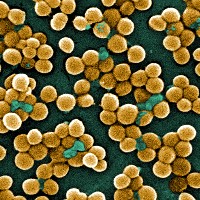
Scanning electron micrograph image of MRSA bacteria (Janice Haney Carr, Centers for Disease Control and Prevention)
The U.S. Food and Drug Administration today cleared the first test for Staphylococcus aureus (S.aureus) infections that can identify whether the bacteria are methicillin resistant (MRSA) or methicillin susceptible (MSSA). The KeyPath MRSA/MSSA Blood Culture Test is made by Microphage Inc. of Longmont, Colorado.
According to the Centers for Disease Control and Prevention, MRSA is a type of staph bacteria that is resistant to certain antibiotics that include methicillin and other more common antibiotics, such as penicillin and amoxicillin. Most MRSA infections are skin infections, but more severe or potentially life-threatening MRSA infections often occur among patients in health care settings.
The KeyPath MRSA/MSSA Blood Culture Test determines whether bacteria growing in a patient’s positive blood culture sample are MRSA or MSSA within about five hours after any bacterial growth is first detected in the sample. Aside from blood culture equipment, the test does not require any specific instruments to get results, which makes it useful for most laboratories.
FDA says it based its clearance on a clinical study of 1,116 blood samples evaluated at four U.S. hospital centers. Among the S.aureus organisms in the samples, the MRSA determination was 98.9% accurate (178/180) and the MSSA determination was 99.4% accurate (153/154). In December 2009, MicroPhage received a CE Mark to market the KeyPath test in Europe.
Read more: FDA Approves Two-Minute IV for Superbug Skin Complications
* * *

 RSS - Posts
RSS - Posts
You must be logged in to post a comment.